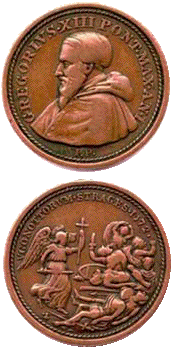August 24: Christians Slaughtering Christians
Saint Bartholomew's Day Massacre (1572)
It was on this date, August 24, 1572, that the bloodiest massacre of Christians by Christians began in France – the Saint Bartholomew's Day Massacre. The Reformation of the corrupt practices of the Roman Catholic Church, which had begun in Germany, had spread to France and gained many followers, including the heir to the French throne, his brother and sons, and some of the highest French nobles. The French Protestants were called Huguenots and there was considerable tension between the cohabiting Christian sects.
Catherine de' Medici, a relative of Pope Clement VII, married the duke of Orléans at age 14; he would become King Henry II of France. But Henry died after about six years of rule, and his successor, Francis II, died the year after that, leaving Catherine as regent for the 10-year-old Charles IX. Catherine let the Jesuits back into France and, seeing the alarming probability that the Reformation might gain a toehold in France, the Jesuits began circulating provocative rumors (1567) of a Huguenot plot to sack and burn Paris.
The Huguenot leader, Admiral Coligny, began to exercise more influence over Charles in matters of state than Catherine, so she used the occasion of a political marriage designed to make peace between Protestants and Catholics – the marriage of Henry of Navarre to Marguerite de Valois – to have Coligny assassinated. The plot failed and Coligny was only wounded, but the Huguenot leaders, assembled in Paris in great numbers for the wedding, were infuriated.
Charles vowed punishments for the plotters, but with all the important heretics in one place, Catherine saw her final solution to the Huguenot problem: She browbeat the young King into approving a massacre – for reasons of national security. On Sunday, 24 August 1572, at daybreak, French Catholic troops and Catholic citizens drew blood. An eyewitness described the scene:
...the streets and ways did resound with the noise of those that flocked to the slaughter and plunder, and the complaints and doleful out-cries of dying men, and those that were nigh to danger were every where heard. The carkasses of the slain were thrown down from the windows, the Courts & chambers of houses were full of dead men, their dead bodies rolled in dirt were dragged through the streets, bloud did flow in such abundance through the chanels of the streets, that full streams of bloud did run down into the River: the number of the slain men, women, even those that were great with child, and children also, was innumerable.*
The slaughter in Paris lasted until 17 September, but spread to the provinces, where it continued until 3 October. Admiral Coligny was among the dead. In all of France about 50,000 were slain – more than twice as many people killed over religion in 40 days, as French revolutionaries killed over politics in three years!
When news of this holocaust of French Protestants reached the world, Catherine de' Medici received the congratulations of all the Catholic powers, and Pope Gregory XIII ordered bonfires lighted and the singing of the Te Deum. Indeed, the Pope's joy was so great that he commanded a gold medal to be minted, with the inscription, "Slaughter [strages] of the Huguenots." He then had Giorgio Vasari paint pictures in the Vatican of "the glorious triumph over a perfidious race."
On the other hand, an ecclesiastical annalist named Strype suggested that the comet of 1572 was a message of Divine wrath provoked by the massacre. But if God was angry, he could have does something more serious than flinging a comet into the sky; if God even cared, he made no move to turn the events. The St. Bartholomew's Day massacre of 1572 remains one of the most infamous episodes in the bloody history of religion.
* Jacques-Auguste de Thou's History of the Bloody Massacres of the Protestants in France in the year of our Lord, 1572 (London, 1674). The writer was a young man at the time of the Saint Bartholomew's Day Massacre, parts of which he witnessed. De Thou helped to draft the Edict of Nantes, which (briefly) granted toleration to the Huguenots in France. He goes on,
"At the same time, but with greater slaughter, were things carried at Rouen, where Tanaquilius Venato Garrugius, the Governor of the chief Nobility of Provence, a man of a merciful disposition, did what he could to hinder it. But at last, not being able any longer to withstand the violence of the seditious, (and especially of those who, the year before, were, by the decree of the Judges, delegated from Paris, proscribed, who hoped that, by this course, they should both revenge the injury offered them, and also obliterate the memory of the Decree), many were thrown into prison, and afterwards 15 Kal. of VIIIbr [September 17]. being called out one by one by the voice of the Cryer, were cruelly slain by those Emissaries, Maronimus a most wicked wretch leading them on. Upon this they set upon private houses, and that day and the day following they fell upon men & women, without distinction, and 500 of both sexes and all ages were slain, and their bodies being stripped, were cast into the ditches at Portam Caletenfem, and their garments all bloudy as they were, were distributed among the poor, they seeking even by these murders to ingratiate themselves with the people. This the Senate was in shew offended at, and began to proceed against the Authors of this fact: but through connivance it came to nothing, the murderers and cut-throats for a time slipping out of the City."
Originally published August 2003 by Ronald Bruce Meyer.




